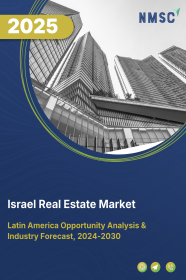
Turkey Real Estate Market by Property Size (Small, Medium, and Large), by Property Type (Residential, Commercial, Land, and Industrial), by Transaction Type (Buying, Selling, Leasing, Renting, Real Estate Investment), by Ownership (Owner-Occupied Properties, Rental Properties, Co-ownership), by Property Value (Affordable Housing, Luxury Housing, Ultra-Luxury Housing) and by End User (Individual Buyers, Business Entities, and Government) – Opportunity Analysis and Industry Forecast, 2024–2030
Industry: Construction & Manufacturing | Publish Date: 23-May-2025 | No of Pages: 179 | No. of Tables: 139 | No. of Figures: 84 | Format: PDF | Report Code : CM1235
US Tariff Impact on Turkey Real Estate Market
Trump Tariffs Are Reshaping Global Business
Market Definition
The Turkey Real Estate Market size was valued at USD 126.8 million in 2023, and is predicted to reach USD 173.7 million by 2030, at a CAGR of 4.6% from 2024 to 2030.
The real estate industry constitutes a multifaceted market involving the acquisition, development, and management of residential and commercial properties. This expansive sector includes residential real estate, catering to individuals and families, as well as commercial and industrial real estate, focused on business operations and manufacturing. Real estate development involves the creation and enhancement of properties, while real estate investment encompasses acquiring properties for financial gain.
Additionally, a range of professional services, such as those provided by real estate agents and property managers, contributes to the industry's dynamics. Influenced by economic trends, demographic shifts, and regulatory factors, the real estate market is a complex landscape where various stakeholders engage in activities that shape urban environments, support economic growth, and provide investment opportunities.
Influence Of Economic Indicators Such As Interest Rates Is Driving Turkey’s Real Estate Growth
In Turkey, economic indicators have a profound impact on the real estate sector. Interest rates, determined by the Central Bank of the Republic of Turkey (CBRT), are a critical lever. Lower interest rates stimulate demand for residential and commercial properties by making mortgage financing more accessible and affordable. Conversely, higher rates tend to dampen demand by raising borrowing costs.
Inflation is another major economic factor in Turkey, as it directly affects construction costs, property prices, and rental yields. The volatility of the Turkish lira and inflationary pressures can shift investor behavior, often leading to a preference for real assets like real estate as a hedge against currency depreciation.
Employment levels and wage growth further influence purchasing power and confidence in long-term investments. Rising GDP and urbanization rates, particularly in cities like Istanbul, Ankara, and Izmir, are fostering strong demand in both residential and commercial segments.
Rapid Population Growth And Urbanization Fuel Market Expansion In Turkey
Turkey's population, exceeding 85 million, is growing steadily and becoming increasingly urbanized. This demographic shift has been a primary driver of housing demand, especially in major urban centers. Cities such as Istanbul, Ankara, and Antalya are witnessing surging demand for residential units, office spaces, and modern infrastructure.
Additionally, the country has become a popular destination for foreign buyers and real estate investors, especially from the Middle East, Russia, and Europe, attracted by Turkey’s Citizenship by Investment Program, favorable climate, and strategic geographic location.
The young and growing population, coupled with internal migration to cities for employment and education, is expanding the rental and sales markets. This presents substantial opportunities for developers to diversify their offerings, including affordable housing, luxury residences, and mixed-use developments tailored to evolving consumer preferences.
Environmental Regulations And Sustainability Requirements Restrain Market Growth In Turkey
In Turkey, environmental concerns are increasingly shaping the real estate landscape. Urban expansion, deforestation, and coastal development have drawn attention from environmental watchdogs and prompted more stringent regulations by both national and municipal authorities. Real estate developers are now expected to adhere to green building codes, obtain environmental impact assessments (EIA), and incorporate energy-efficient systems, especially in major metropolitan areas.
While these sustainability-driven changes are necessary, they often increase construction and compliance costs, potentially reducing margins and slowing down project timelines. Additionally, limited awareness and expertise in green building practices among some local developers can create implementation hurdles. Thus, environmental and regulatory pressure remains a significant constraint in the Turkish real estate market, particularly for large-scale and infrastructure-intensive developments.
Growth Of Smart City Initiatives And Sustainable Urban Projects In Turkey Offers Strong Opportunities
Turkey is actively embracing smart city development as part of its national urban transformation agenda. Government-backed initiatives, such as the “Smart Cities Strategy and Action Plan (2020–2023)”, are designed to improve energy efficiency, infrastructure quality, and digital integration in urban environments. Cities like Istanbul, Ankara, Konya, and Izmir are piloting projects involving smart traffic systems, IoT integration in buildings, and green infrastructure.
These efforts open significant opportunities for real estate developers and technology providers to collaborate on future-ready housing, commercial, and mixed-use projects. The integration of smart technologies, sustainable materials, and digital infrastructure increases property value and marketability—especially among young professionals, international buyers, and environmentally conscious investors.
The rising focus on renewable energy, waste reduction, and climate-resilient construction further positions Turkey’s real estate market to align with global investment trends toward Environmental, Social, and Governance (ESG) standards.
Competitive Landscape
The market players operating in the Turkey real estate market include Turesta International Real Estate, MAB Turkey, Turk.Estate (PROinvest WORLD), DIYAR TÜRK, CAYAN GROUP, Vartur Real Estate and Investment, Turkey Homes, Realtor Global, Cushman And Wakefield, Antalya Homes, Istanbul Real Estate, RE/MAX Turkey, Coldwell Banker Turkey, Prime Property Turkey, Ebla Real Estate and others.
Turkey Real Estate Market Key Segments
By Property Size
-
Small (<500 sq. ft.)
-
Medium (500–2000 sq. ft.)
-
Large (2000+ sq. ft.)
By Property Type
-
Residential
-
Apartments/Flats
-
Single-Family Homes
-
Multi-Family Homes
-
Condominiums
-
Townhouses
-
Vacation Homes
-
-
Commercial
-
Office Spaces
-
Retail Spaces
-
Co-working Spaces
-
Warehouses
-
-
Land
-
Urban Plots
-
Suburban/Rural Plots
-
-
Industrial
-
Manufacturing Plants
-
Distribution Centers
-
Data Centers
-
By Transaction Type
-
Buying
-
Selling
-
Leasing
-
Renting
-
Real Estate Investment
-
Direct Property Investment
-
Real Estate Investment Trusts (REITs )
-
By Ownership
-
Owner-Occupied Properties
-
Rental Properties
-
Co-ownership
By Property Value
-
Affordable Housing
-
Luxury Housing
-
Ultra-Luxury Housing
By End User
-
Individual Buyers
-
Business Entities
-
Startups
-
SMEs
-
Large Corporations
-
-
Government
-
Civic Projects
-
Affordable Housing Initiatives
-
Key Market Players:
-
Turesta International Real Estate
-
MAB Turkey
-
Turk.Estate (PROinvest WORLD)
-
DIYAR TÜRK
-
CAYAN GROUP
-
Vartur Real Estate and Investment
-
Turkey Homes
-
Realtor Global
-
Cushman And Wakefield
-
Antalya Homes
-
Istanbul Real Estate
-
RE/MAX Turkey
-
Coldwell Banker Turkey
-
Prime Property Turkey
-
Ebla Real Estate
REPORT SCOPE AND SEGMENTATION:
|
Parameters |
Details |
|
Market Size in 2023 |
USD 126.8 Million |
|
Revenue Forecast in 2030 |
USD 173.7 Million |
|
Growth Rate |
CAGR of 4.6% from 2024 to 2030 |
|
Analysis Period |
2023–2030 |
|
Base Year Considered |
2023 |
|
Forecast Period |
2024–2030 |
|
Market Size Estimation |
Million (USD) |
|
Growth Factors |
Influence Of Economic Indicators Such As Interest Rates Is Driving Turkey’s Real Estate Growth Rapid Population Growth And Urbanization Fuel Market Expansion In Turkey |
|
Companies Profiled |
15 |
|
Market Share |
Available for 10 companies |
|
Customization Scope |
Free customization (equivalent up to 80 working hours of analysts) after purchase. Addition or alteration to country, regional, and segment scope. |
|
Pricing and Purchase Options |
Avail customized purchase options to meet your exact research needs. |

















 Speak to Our Analyst
Speak to Our Analyst

















